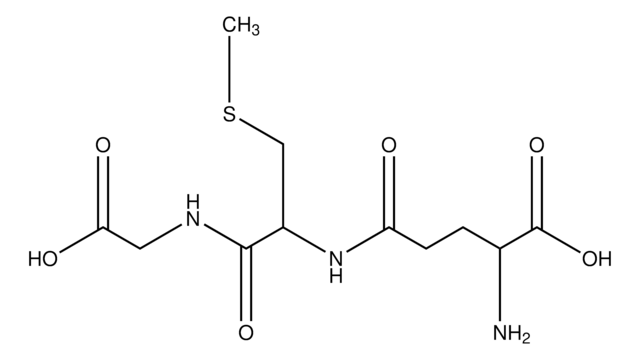H6886
S-Hexylglutathione
>98% (TLC), suitable for ligand binding assays
Synonym(s):
S-Hexyl-L-glutathione reduced
About This Item
Recommended Products
product name
S-Hexylglutathione,
Assay
>98% (TLC)
Quality Level
form
powder
technique(s)
ligand binding assay: suitable
mp
200-202 °C
storage temp.
2-8°C
SMILES string
CCCCCCSC[C@H](NC(=O)CC[C@H](N)C(O)=O)C(=O)NCC(O)=O
InChI
1S/C16H29N3O6S/c1-2-3-4-5-8-26-10-12(15(23)18-9-14(21)22)19-13(20)7-6-11(17)16(24)25/h11-12H,2-10,17H2,1H3,(H,18,23)(H,19,20)(H,21,22)(H,24,25)/t11-,12-/m0/s1
InChI key
HXJDWCWJDCOHDG-RYUDHWBXSA-N
Related Categories
Amino Acid Sequence
Application
Biochem/physiol Actions
Storage Class Code
11 - Combustible Solids
WGK
WGK 3
Flash Point(F)
Not applicable
Flash Point(C)
Not applicable
Personal Protective Equipment
Certificates of Analysis (COA)
Search for Certificates of Analysis (COA) by entering the products Lot/Batch Number. Lot and Batch Numbers can be found on a product’s label following the words ‘Lot’ or ‘Batch’.
Already Own This Product?
Find documentation for the products that you have recently purchased in the Document Library.
Our team of scientists has experience in all areas of research including Life Science, Material Science, Chemical Synthesis, Chromatography, Analytical and many others.
Contact Technical Service






